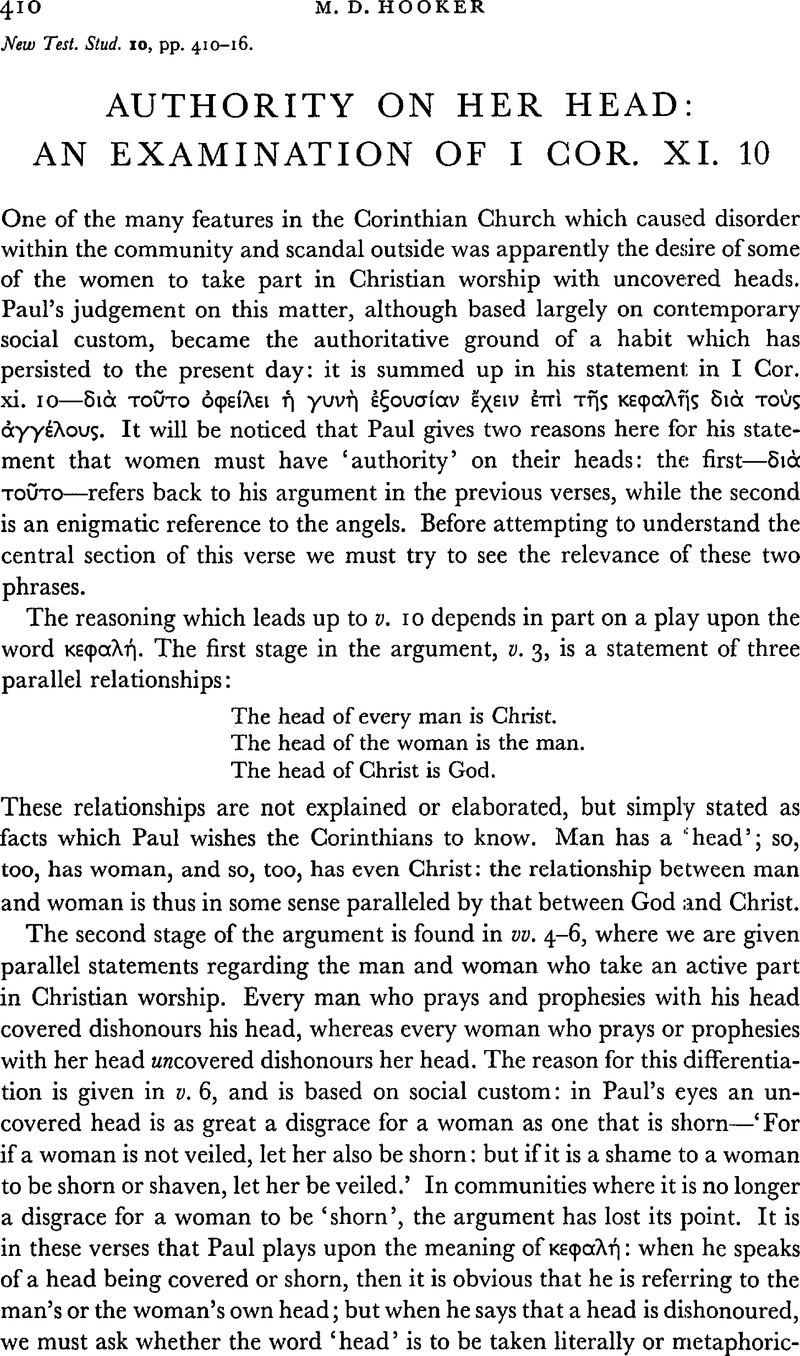Article contents
Authority on her Head: An Examination of I Cor. xi. 10
Published online by Cambridge University Press: 05 February 2009
Abstract

- Type
- Short Studies
- Information
- Copyright
- Copyright © Cambridge University Press 1964
References
page 411 note 1 Cf. Rashi on Isa. xliv. 13, who explains ![]() as a reference to woman, who is the glory of her husband.
as a reference to woman, who is the glory of her husband.
page 411 note 2 Gen. v. 3.
page 411 note 3 Jewish exegesis interpreted Gen. i. 27 of Adam, and ignored Eve. For example, Life of Adam and Eve, xii–xvii.
page 412 note 1 So Lietzmann, H., Handbüch z. N. T.: An die Korinther I, II (Tübingen, 1931), in loc.Google Scholar
page 412 note 2 Cf. Test. Reuben, v. 1, 5, 6: ‘Evil are women, my children; and since they have no power or strength over man, they use wiles by outward attractions that they may draw him to themselves…. Command your wives and your daughters, that they adorn not their heads and faces to deceive the mind…. For thus they allured the Watchers who were before the flood’ (trans. by R. H. Charles, The Testaments of the Twelve Patriarchs, 1908).Google Scholar
page 412 note 3 Cf. Strack-Billerbeck, , Kommentar z.N.T. III (2nd ed., 1954), 437–40.Google Scholar
page 412 note 4 Foerster, W., έξουσια, T.W.N.T. II, 570 f. R. St J. Parry, Cambridge Greek Testament: I Corinthians (1916), in loc.Google Scholar
page 412 note 5 Cf. Rom. viii. 38. Caird, G. B., Principalities and Powers (1956), pp. 15–22, interprets the angels in I Cor. vi. 3 and xi. 10 as the powers behind the pagan world order. T. W. Manson (On Paul and John, 1963, pp. 19f.), suggests that in Paul ‘angels are not always nor even generally good’; he shows how in Gal. iii. 18–iv. 9 they are the means by which the Law is given—and are therefore instrumental in bringing bondage (cf. Col. ii. 18). Alongside Manson's interpretation of this passage, however, one must also remember that the Law was ultimately God-given, and that if Paul had been asked whether the angels concerned were evil, he would probably have replied (as he did in Rom. vii. 7 in reply to the same question regarding the Law itself) μ γνοıτο. Aγγελος in itself is a morally neutral term, and can be used of a messenger from God (Gal. i. 8; iv. 14) or from Satan (II Cor. xii. 7). But when the context, as here, is concerned with creation and worship, there is at least a suggestion of ‘goodness’.Google Scholar
page 412 note 6 Cf. Kähler, E., Die Frau in den Paulinischen Briefen (Zürich, 1960), pp. 59–65.Google Scholar
page 413 note 1 The idea of angels witnessing men's actions is found in I Cor. iv. 9.
page 413 note 2 Kittel, G., Arbeiten für Religionsgeschichte des Urchristentums, Band I, Heft 3 (Leipzig, 1920), PP. 17–30.Google Scholar
page 413 note 3 Ramsay, W., The Cities of St Paul (1907), pp. 202–5. E. B. Allo, Saint Paul: Première Épîttre aux Corinthiens (Paris, 1934), in loc.Google Scholar
page 413 note 4 Robertson, A. and Plummer, A., I.C.C.: I Corinthians (1914), in loc. R. St J. Parry, op. cit. in loc. Cf. Rev. xi. 6, xiv. 18 and xx. 6.Google Scholar
page 413 note 5 W. Foerster, loc. cit.
page 413 note 6 Ramsay, W., op. cit. p. 203, protests that the equation of authority on the head with that to which the woman is subject is ‘a preposterous idea which a Greek scholar would laugh at anywhere except in the New Testament’. Similarly, E. B. Allo, loc. cit.: ‘Cependant il a été observé avec justesse (J. Weiss, Ramsay), que tous les emplois connus du mot έξουσια sont actifs, et se réfèrent à une puissance exercée, et non à une puissance subie par quelqu'un.’Google Scholar
page 414 note 1 Op cit. pp. 43 ff.
page 415 note 1 Exod. xxxiv. 29–35.
page 415 note 2 According to one tradition, the angels worshipped Adam at the creation, either by mistake (Gen. R. viii. 10, Eccles. R. vi. 9. 1) or by divine command (Life of Adam and Eve, xii–xvii). It is possible, then, that Paul thinks there is a danger that the angels might be misled into worshipping man if his ‘glory’ is displayed.
page 415 note 3 Cf. Ps. viii. 4–8; Ecclus. xvii. 3f.; Apoc. Moses x–xii, xxi. 6; 2 En. xxxi. 3; Gen. R. viii. 10, xii. 6; Bab. Baba Bathra 58a; Pirque R. El. xi. Cf. J. Jervell, Imago Dei (Göttingen, 1960), pp. 37–40.Google Scholar
page 415 note 4 Eve is ignored in Life of Adam and Eve xii–xvii, Apoc. Moses xxiv. 4, 2 En. lviii. 3–6. Cf. J. Jewell, op. cit. pp. 40f.
- 6
- Cited by


